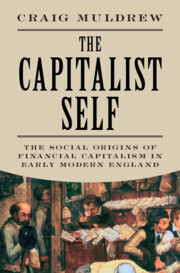Book contents
- The Capitalist Self
- The Capitalist Self
- Copyright page
- Dedication
- Contents
- Figures
- Tables
- Acknowledgements
- Introduction: Capitalism and Dependence
- 1 Early Modern Capitalism: A Concept Too Big to Fail?
- 2 Value in Motion: The Inheritance of Merchant Capital and Debates over Credit
- 3 The Financial Revolution in English Localities
- 4 Little Land Banks: The Mortgaging Revolution and Savings on Bond
- 5 An Ethical Fulcrum: From Participation in the Body of Christ to the Happy Self
- 6 Practical Ethics, the Self, and the Economy in an Era of Religious Dissent
- 7 The Transformation of Legal Culture
- 8 The Dark Side of Thrift: Capital and Class Formation – Institutional Stability and Ethical Inequality
- 9 The Success of the First ‘Modern’ Banks: Scotland and the Thirteen Colonies, and Failure in France
- 10 The Emergence of Local Bankers in England: Savings and Adam Smith’s ‘Capitalism’
- Conclusion
- Select Bibliography
- Index
- References
Select Bibliography
Published online by Cambridge University Press: 12 October 2025
- The Capitalist Self
- The Capitalist Self
- Copyright page
- Dedication
- Contents
- Figures
- Tables
- Acknowledgements
- Introduction: Capitalism and Dependence
- 1 Early Modern Capitalism: A Concept Too Big to Fail?
- 2 Value in Motion: The Inheritance of Merchant Capital and Debates over Credit
- 3 The Financial Revolution in English Localities
- 4 Little Land Banks: The Mortgaging Revolution and Savings on Bond
- 5 An Ethical Fulcrum: From Participation in the Body of Christ to the Happy Self
- 6 Practical Ethics, the Self, and the Economy in an Era of Religious Dissent
- 7 The Transformation of Legal Culture
- 8 The Dark Side of Thrift: Capital and Class Formation – Institutional Stability and Ethical Inequality
- 9 The Success of the First ‘Modern’ Banks: Scotland and the Thirteen Colonies, and Failure in France
- 10 The Emergence of Local Bankers in England: Savings and Adam Smith’s ‘Capitalism’
- Conclusion
- Select Bibliography
- Index
- References
Information
- Type
- Chapter
- Information
- The Capitalist SelfThe Social Origins of Financial Capitalism in Early Modern England, pp. 426 - 440Publisher: Cambridge University PressPrint publication year: 2025
References
Primary Sources
Secondary Sources
Accessibility standard: Inaccessible, or known limited accessibility
Why this information is here
This section outlines the accessibility features of this content - including support for screen readers, full keyboard navigation and high-contrast display options. This may not be relevant for you.Accessibility Information
Content Navigation
Allows you to navigate directly to chapters, sections, or non‐text items through a linked table of contents, reducing the need for extensive scrolling.
Provides an interactive index, letting you go straight to where a term or subject appears in the text without manual searching.
Reading Order & Textual Equivalents
You will encounter all content (including footnotes, captions, etc.) in a clear, sequential flow, making it easier to follow with assistive tools like screen readers.
You get concise descriptions (for images, charts, or media clips), ensuring you do not miss crucial information when visual or audio elements are not accessible.
You get more than just short alt text: you have comprehensive text equivalents, transcripts, captions, or audio descriptions for substantial non‐text content, which is especially helpful for complex visuals or multimedia.
Visual Accessibility
You will still understand key ideas or prompts without relying solely on colour, which is especially helpful if you have colour vision deficiencies.
You benefit from high‐contrast text, which improves legibility if you have low vision or if you are reading in less‐than‐ideal lighting conditions.
